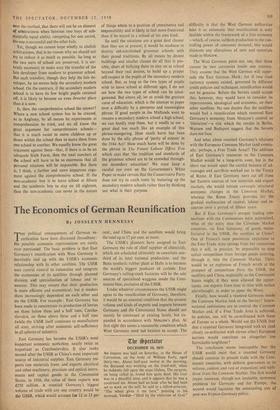The Economics of German Reunification
By JOSSLEYN HENNESSY TLIE political consequences of , German re- unification have been discussed threadbare: the possible economic repercussions are rarely ever mentioned. The basic problem is that East Germany's reunification with West Germany is inevitably tied up with the USSR's economic relationship with its other satellites. The USSR uses central control to rationalise and integrate the economies of its satellites through planned division and specialisation of labour and re- sources. This may ensure that their production is more efficient and economical; but it renders them increasingly dependent on each other and on the USSR. For example: East Germany has been made to concentrate its production of lorries on those below three and a half tons; Czecho- slovakia, on those above three and a half tons (while the USSR itself continues to manufacture all sizes, striving after economic self-sufficiency in all spheres of industry).
East Germany has become the USSR's most important economic workshop, nearly twice as important as Czechoslovakia. It also ranks second after the USSR as China's most important source of industrial supplies. East Germany im- ports raw materials from, and exports electrical and other machinery, precision and optical instru- ments and capital goods to the Communist States; in 1956, the value of these exports was £250 million. A reunited Germany's biggest volume of trade with any one country would be the USSR, which would account for 12 to 13 per cent., and China and the satellites would bring the total up to 17 per cent, or more.
The USSR's planners have assigned to East Germany the role of chief supplier of chemicals, which are scheduled ultimately to constitute one- third of its total national production; and the Buna synthetic rubber plant at Halle is to become the world's biggest producer of carbide. East Germany's rolling-stock factories will be the sole sources of specialised waggons inside the Com- munist bloc, exclusive of the USSR.
Under whatever circumstances the USSR might agree to the reunification of Germany, therefore, it would be an essential condition that the present volume and kinds of exports and imports between Germany and the Communist States should not merely be continued at existing levels, but ex- panded in accordance with Moscow's plan. At first sight this seems a reasonable condition which West Germany need not hesitate to accept. The difficulty is that the West German authorities take it as axiomatic that reunification is only feaSible within the framework of a free economy —which, of course, subjects production to the con- trolling power of consumer demand; this would dislocate any allocations of men and materials made in Moscow.
The West Germans point out, too, that there cannot be two currencies inside one country. They assume that the West German will super- sede the East German Mark; for if two rival currency systems existed, governed by different credit policies and techniques, reunification would not be genuine. Before the Soviets could accept this, however, they would have to consider its repercussions, ideological and economic, on their other satellites. No one doubts that the satellites would hail a reunification which removed East Germany's economy from Moscow's control as liberation'—a risk which the revolts in Berlin, Warsaw and Budapest suggest that the Soviets dare not face.
And what about reunited Germany's relations with the European Common Market (and eventu- ally, perhaps, a Free Trade Area)? The addition of East Germany's resources to the Common Market would be a long-term asset, but in the short run would upset the careful balance of ad- vantages and sacrifices worked out in the Treaty of Rome. If East Germany were cut off from her Eastern sources of raw materials and export markets, she would initiate overnight structural economic changes in the Common Market, whereas the Rome Treaty provides for the gradual reallocation of capital, labour and re- sources over a period of fifteen years.
But if East Germany's present trading con- nections with the Communists were maintained, what of the entry into the Common Market countries, via East Germany. of goods manu- factured in the USSR, the satellites or China? One of France's most passionate objections to the Free Trade Area springs from her contention that it will, in practice, be impossible to stop unfair competition from foreign goods entering, through it, into the Common Market. There would be an explosion of French wrath at the prospect of competition from the USSR, the satellites and China (especially as the Communist States might, if they were allowed the oppor- tunity, use exports from time to time with malice aforethought, in order to upset the West).
Finally, how would a reunited Germany inside the Common Market look to the Soviets? Supra- national institutions are to control the Common Market and, if a Free Trade Area is achieved, its policies, too, will be co-ordinated with those of Europe as a whole. Would not the USSR fear that a reunited Germany integrated with six (and closely co-ordinated with eleven other) European nations would constitute an altogether too formidable neighbour?
The conclusion seems inescapable that the USSR would insist that a reunited Germany should continue its present trade with the Com- munist countries, with definite guarantees as to volume, content and rate of expansion; and with- draw from the Common Market. The first would create immense, though not insoluble, economic problems for Germany and for Europe; the second would liquidate the outstanding aim of post-war Franco-Germany policy.






































 Previous page
Previous page